Nepal and the European Union (EU) have shared a long-standing partnership and friendship. The EU has been an important development partner of Nepal. It has supported Nepal’s development priorities, and is willing to continue to support Nepal on its path to graduation from Least Development Country.
Ishwar Dev Khanal and Kabita Shrestha from Khabarhub talked to Nona Deprez, EU Ambassador to Nepal on various issues ranging from the EU’s support to human rights, among others. Excerpts:
You have been here for six months now, and Nepal seems to have been heading towards political instability. How do you see Nepal’s political future?
I am honored and privileged to be the European Union Ambassador to Nepal. Regarding the current political crisis in Nepal, I am not in a position to preempt the verdict by the Supreme Court, which is the guardian of the constitution. I am sure it will determine the way forward.
EU has been Nepal’s development partner for over six decades now and of late we have heard EU stating that it wishes to become not only a development partner of Nepal but also a political partner. How should people understand this?
Indeed, European Union is Nepal’s long-standing, reliable, predictable, trustworthy partner and friend. We intend to continue this. What we want to do that Nepal since is graduating from Least Development Country, we can make sure that we can work together for common priority, values and interest such as Nepal’s ambitions towards green recovery.
We would continue to support Nepal’s ambitious mission for green recovery. Furthermore, we want to be a development partner as well as an aid partner for Nepal in terms of building a partnership for global responses to global challenges.
As we know Nepal is vulnerable to climate change, the issue is the EU’s top priority. We can work together on this bilaterally, and work together towards multilateralism to make sure that these global challenges find a global response.
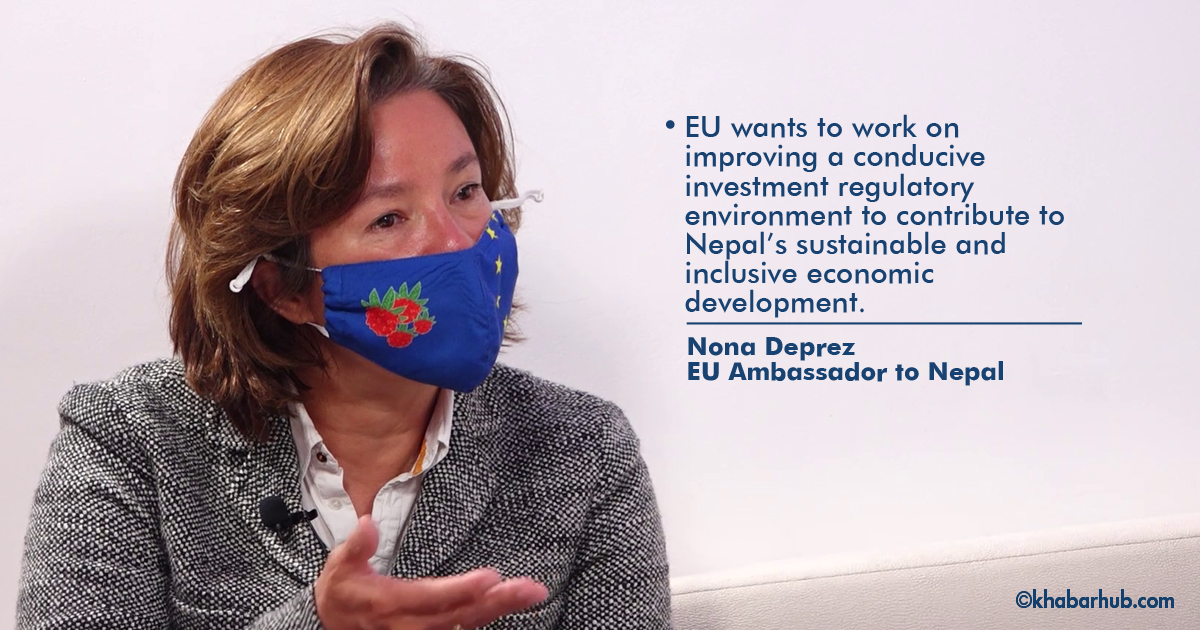
The EU witnessed a change of guard sometime back on climate change. What are the priorities of new EU leadership?
I am honored and privileged to be the one who can disseminate the positive and outward-looking message from the EU to Nepal.
The EU leadership has a top priority such as the green recovery, development, and then, of course, gender equality, which really needs to be mainstreamed not only in the European Union but with also our partners abroad. And these are things which we can really work together in Nepal, too.
How do you assess the investments of the EU for Nepal’s development in the past six decades, and to what extent has it succeeded to better the lives of an average Nepali national?
We have been working together for a long time. We can be proud of some of the results that have been achieved. Just to name a few, the European Union has invested 100 million Euros.
This is really working together supporting Nepali authorities in increasing access to education, not only the primary and secondary education but also the technical and vocational education besides emphasizing the equality and the quality outcome of education to make sure that all of these students will get opportunities in the future.
How do you visualize the EU’s position on the global stage in the next twenty years?
We have a very positive message. It is quite obvious that all governments throughout the world have undergone a crisis because of the COVID-19 pandemic.
There is a natural human tendency to look inwards. But the European Union has not done that. We have able to agree on greater solidarity among European Union member states to move forward particularly on Covid-19 recovery.
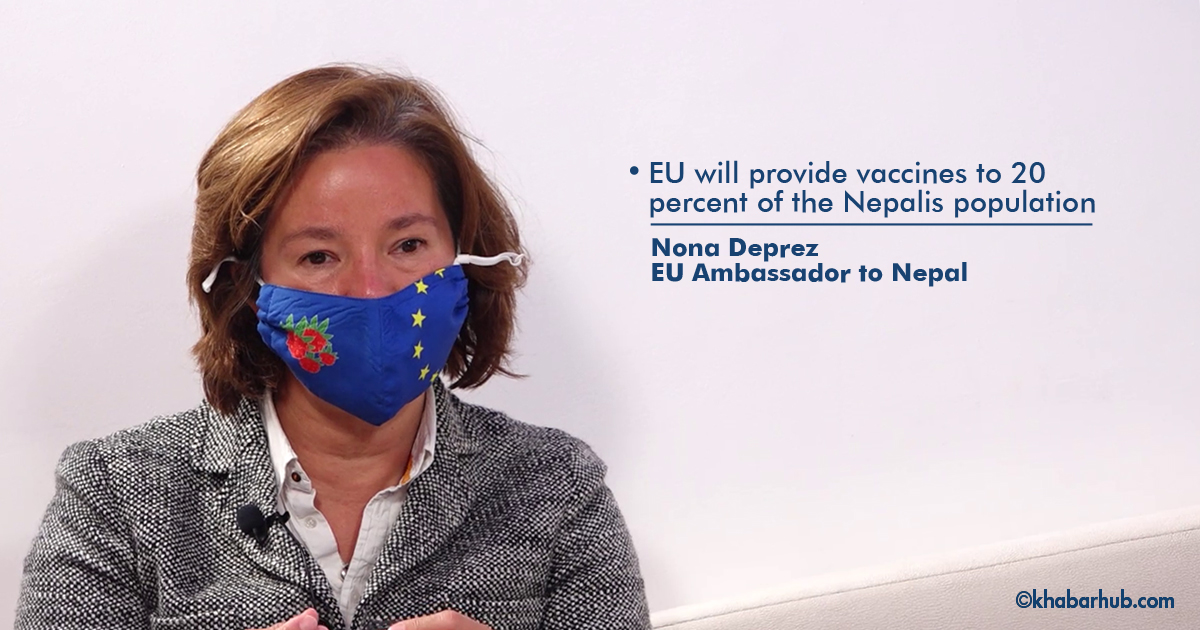
We have spearheaded global efforts to make sure that the COVID-19 vaccine becomes a global public good. This is where I am very proud that the EU and its member states are one of the bigger donors for the COVID-19 facility, which will provide vaccines to 20 percent of the Nepalis population. We can win this if we all are vaccinated.
How do you assess the bilateral relationship between Nepal and the EU?
The bilateral relationships between Nepal and the EU are really good. My team and I will spare no effort to make sure that the EU people and the Nepali people can come closer together.
Moreover, people to people contact is very important. We also have trade relations, and most importantly, the EU supports Nepal’s development strategies.
How can Nepal and the EU benefit from each other in terms of trade and commerce to other areas?
This is, in fact, very important and is the EU’s priority. As I said earlier, we want to work together with our partners. Trade is a very important aspect of our relations which could be enhanced and could be improved.
What we like to do is that we want to work on improving a conducive investment regulatory environment to make sure that this is conducive for investment, and to make sure that this can also contribute to Nepal’s sustainable and inclusive economic development.
For this, it is important to have global standards so that we can also have a global and leverage playing field to make sure that there is also an equal competition where we can work together on these standards.
It is also equally important for the EU that now we take this opportunity to go to a green transition, which is environmentally sustainable, physically sustainable, economically sustainable and socially sustainable that keeps no one behind.
All of these are interlinked. And in order to have economically sustainable development, we need to have peace and stability. Moreover, we have seen that all of these crises, such as the climate crisis or the COVID-10 pandemic are linked.
How important is the EU for Nepal’s development and foreign investment?
As I said, the EU is a very important development partner of Nepal. The EU has provided a lot of funds to support Nepal’s development priorities. It is also very much willing to continue to support Nepal on its path to graduation from Least Development Country.
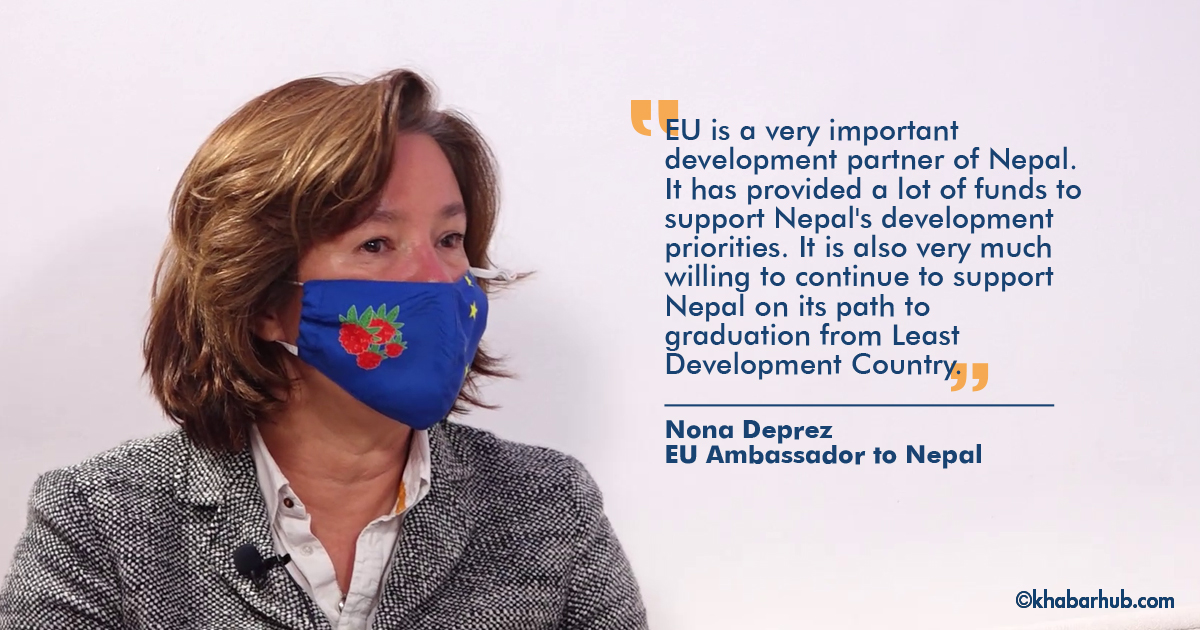
What exactly are the EU priorities here?
The EU is now starting to formulate its next financial programming under the neighborhood development and international cooperation instrument.
We have now started discussions with the Nepali authorities, civil society, media and government, as well as with other development partners to make sure that we find those areas to support Nepal’s priority where we can make the most impact and the most transformative impact.
This is just the start of the formulation of the next programming, which will lead from 2021 to 2027. This December, all development partners – as part of the international development partners group — have supported Nepal’s priorities towards a green recovery and relief package.
The EU’s topmost priority is to support Nepal Green Grow, and we would also continue to support the Human Capital Development in Nepal that remains a very crucial and essential sector.
Other priorities include supporting peace, promoting and protecting human rights, fundamental freedom, and the rule of law.
What are the developments that have taken place to maintain people-to-people relations between the EU and Nepal?
I am very happy to say that Nepal’s youths are successful in getting scholarships under our flagship program ‘Erasmus Mundus Scholarships’. Erasmus is the program for Nepali students having experience in European Union’s universities where they can share the experience with European students, and bring back their knowledge and experience to Nepal. This is one very positive and enriching people to people exchanges.
The EU is seen as a leader in climate negotiations. What are the EU’s preparations for the upcoming COP 26 to be held in Glasgow?
This is a subject that is close to my heart. As a saying goes: We have not inherited this earth from our ancestors. We are just borrowing it for our children. We have to do something to make a difference.
I have been very proud of the steps that the EU has taken on European Green Deal, which is the EU’s modern economic growth strategy, which we implement not only in the EU but also with the partners such as Nepal.
This not deals with climate action but looks at other areas such as biodiversity, too. We also deal on initiatives that Nepal is very vulnerable to these crises induced by climate change.
What do you mean by saying ‘we borrow for our children’?
We are taking away from the planet more than what we have given back to it. We also need to give something to the planet.
How do you feel to be in the land of Lord Buddha, and the land of Mt Everest?
I feel very privileged and honor to be a European Union Ambassador to Nepal. I am very eager to discover Nepal and Nepali people, their culture and to really exchange and have a better understanding of each other, and keep the conversation going.

Do you have anything to share with the Nepali people?
I have not been able to go out much due to the COVID-19 pandemic. I have been using a lot of precautionary measures and I have not got the opportunity to know better Nepali people and Nepali culture. However, I am very much eager to get to know them and glad to have the opportunity to exchange and learn from each other.


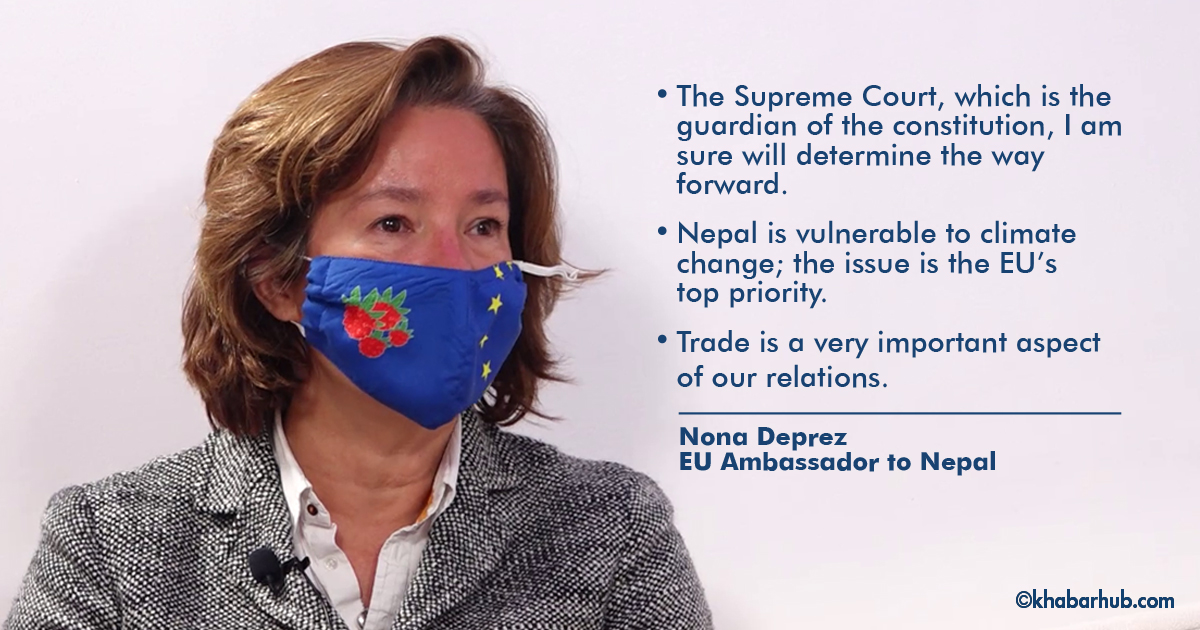
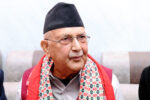
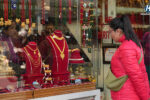
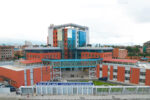



Comment